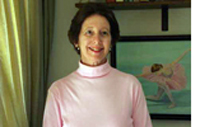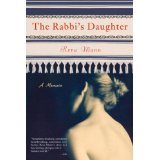The Rabbi’s Daughter, A Memoir by Reva Mann, (Dial Press, 2008)
By Sheila Orysiek

 SAN DIEGO — Writing an unhappy review is never an easy or pleasant task.
SAN DIEGO — Writing an unhappy review is never an easy or pleasant task.
Reva Mann makes the point (from the title onward) that she is the daughter and granddaughter of well known and respected rabbis. Her constant reiteration of how important this lineage is in her life makes her decisions to reject what they taught her to be worthy in an ethical moral life all the more a conundrum – and a depravity.
Though the author uses the nom de plume “Reva Mann” (her real name, Reva Unterman) and changes the name of her grandfather (Isser Yehuda Unterman, former Chief Ashkenazi Rabbi of Israel) and father, (Morris Unterman, Rabbi of West End Marble Arch Synagogue, London) the reader would have no difficulty in discovering the true identities of all concerned. Fortunately, neither of her illustrious forebears lived to read her book and if she truly loves and respects their memories, as she often states she does, she never would have included them in this sordid narrative.
This autobiography has the potential to tell an interesting story about someone who chooses to join a lifestyle – ultra religious Orthodox Judaism – that is often an enigma to many people. However, almost immediately the reader becomes aware of Mann’s fixation on graphic descriptions of her sexual activities. She either felt the need to write with obscene detail because she thought it would help to sell the book or it is evidence of her continuing need to satisfy her self proclaimed addictions. The book could have been so much more; it is sad that the author chose to make it so much less.
Mann blames her rebellion, which includes eagerly defiling the Bima of her father’s synagogue, on a somewhat emotionally detached father, a distracted mother, and the family sorrow over her sister who was mentally disabled at birth. Her turn away from the values of her family leads to expulsion from a Jewish boarding school and to the self destructive world of drugs and gross sexual promiscuity. Then, she moves from her home in London to Jerusalem to attend a school for a career in midwifery. In a rather twisted attempt at redemption, she decides to embrace the strictest of Jewish Orthodoxy and seek a husband within that community – hoping he will lead her to a life of righteousness.
When after marrying a Torah scholar (and having three children), she finds she can no longer cope with the rigorous religious constraints – she handily blames her husband though she sought out that lifestyle – and him – fully aware of all that entailed. She finds her former life of drugs and sex irresistible and she eagerly re-embraces it. Out goes the husband (divorce), in comes the babysitter and off she goes with a man she barely knows to a life of wandering about with him.
There are further health and emotional challenges, including the boyfriend abandoning her. The end of the book finds her on a trip to India with her children, still divorced, sitting in a Hasidic Succoth, and “happy.”
One cannot question a memoir – another person’s life is what it is. But what I do question are the repeated detailed descriptions of her sexual appetites and encounters. This degree of overwrought specificity goes well beyond necessity in any normal storytelling. Thus, the entire memoir becomes tainted and the reader begins to question the writer’s intent. It’s no longer about telling the story of her life – but becomes a part of her need to satiate her addictions and the reader joins the list of her victims.
*
Orysiek is a freelance writer who specializes in arts and literature. Comments may be made in the space provided below this article or sent to the author at sheila.orysiek@sdjewishworld.com